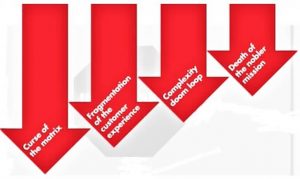Whether you are a fast-growing insurgent from an emerging market, or a very established incumbent multinational, one of the things that we have discovered and really looked at on the question of growth is this topic of do you still have the founder’s mentality? What does founders mentality mean? There are a number of things that happen to companies that blow them off track, from retaining their founder’s mentality. One of the things that is quite fascinating is when you look at the annual reports of the global 2000 top successful companies, on average, the leaders of those companies are projecting to outgrow their markets by two times on a revenue basis, and four times on profit basis.
It’s a reasonable question to ask on any sustained basis over a 10 year period, how many companies actually outgrow their market by two times? The answer is roughly 1 in 10. That means 90% of companies are going to fail to achieve their basic growth ambitions.
When you ask the 90% of companies that fail to achieve their growth projections what was it that led to failure to sustain that growth, the fascinating thing is only in approximately 15% of cases, does the management team cite the markets. They don’t blame the markets when they look and reflect on what happened. They mostly cite internal issues, mainly;

- Their organizational complexity
- What’s happened to their culture
- Inability to get resources at the right point
- Inability to focus
- Weak business plans
- Missing capabilities
- No attractive opportunities
This has led us and the way we think about growth, to conclude that it isn’t simply how you compete in the market, how you drive to leadership, there is something that happens internally as companies grow, that either lead to their success or lead to their downfall. There are two dimensions:
1. To what degree is the company still retaining its founder’s mentality.
2. And to what degree is the company benefiting from the scale and scope that comes with growth.
What we see is, in most cases, companies start as fantastic insurgents, very high founders mentality, with no scale, and scope whatsoever but as they grow the default path, is they move into incumbency, gaining huge benefits of scale and scope, but losing that original insurgent culture. By definition, one of the main things that they lose is founder mentality and that’s huge. What does founders mentality mean? Founder led companies have:
-
Insurgency
Founder-led companies are insurgents; they are at war against their industry on behalf of dissatisfied customers. This leads to a sort of extraordinary sense of nobler mission, a long-term view of what you’re doing with the company.
-
Owners mindset
The other thing you lose is the owner mindset. Owner mindset is this incredible cost mentality, everything, everything is your money. It is this notion of being absolutely bias to action, hatred of bureaucracy, and it’s this personalization of risk, it’s your money.
It is quite interesting with founder-led companies, they’re much more likely to pilot a lot but then if they’ve got a winning proposition, they’re going to bet it all. In contrast, incumbents’ large multinationals will pilot a lot, but then never actually back a bet. They’ll just continue to spend a little money everywhere rather than betting it all on something that’s working.
-
Frontline Obsession
And the final definition is this obsession with the front line. That means they’re talent obsessed, customer-obsessed, advocacy obsessed, and everything is about translating the strategy into frontline behaviors and actions.
One thing that we find extraordinary with incumbents is that they can work for weeks in discussions about strategy without any leader, talking about how it will impact the front line. What does founder’s mentality mean? For founder-led companies, it’s incomprehensible, to talk about strategy without talking about the front line.
Scale and Scope
On the other hand, you’re growing and you’re gaining from the benefits of scale and scope. Here is what you gain when you scale and scope:
-
Leadership Economics
Who wouldn’t want to be a leader in their industry with extraordinary opportunity to put purchasing pressure on the supplier to be able to give customers more and more?
-
Proprietary Assets and Capabilities
You begin to gain a proprietary set of assets and capabilities. You have better brands, you have better capabilities with people, you have good IT systems that collect customer feedback, all extraordinary, and you benefit from the economics of scope. You’re in multiple countries; you learn from those countries, you can roll out the next product that much faster.
And that’s part of the problem of the benefits of scale and scope. Over that time from insurgency to incumbency, the perception may be that the company is continuing to benefit because the benefits of scale and scope have overwhelmed the cost of losing founder mentality but now you’re an incumbency.
You are a different company. You’ve got tremendous scale and scope, but none of that original culture. We start seeing a struggle because scale and scope is no longer a benefit. It is complexity, and it is dragging you south, towards a struggling bureaucracy.
Incumbency Winds
One of the things that we argue is awareness of the wind; we refer to these as the westward winds. Awareness of what are the pressures that lead you on this default path. If you understand what is going on, you can then develop actions to mitigate that. What does founders mentality mean? Let us look at those winds; what happens to insurgents/founders that can lead them into this incumbency trap?

-
Revenue grows faster than talent
The first thing is revenue grows faster than talent. By definition, these are fast-growing companies; you want your revenue to be growing faster than talent, but what you do during that period to address that can make or break a company.
-
The erosion of accountability
The second thing is the erosion of accountability. When companies are very small discussions are about real things. You talk about customers, you talk about the product line, profitability, and what to do with pricing, what to do with cost.
As companies grow, there starts to be the rise of averages. You talk about average customers, you talk about one of the most insidious phrases in business, average gross margin, and people end up in conversations about things that actually have nothing to do with the business. They are the math of the business.
When you are at that level of abstraction, it is no wonder that people no longer feel accountable for activity, because there is no discussion of activity, there’s a discussion of math.
-
The lost voice of the front line
Then there’s this issue of the lost voice of the front line. This is inevitable but it’s insidious. When you start, the people around the table that are making decisions for the company are people that are selling the product and talking to customers every day. Then two things begin to happen.
The first of which is you begin to bring in functional professionals for all the right reasons. You have a head of HR, head of finance, head of supply chain, and these are additional voices around the table. Then the business gets complex enough that you don’t actually have the front line at the table.
You have span breakers that you’ve put in, who manage the front line and you get into a situation where nobody around the table is actually part of the frontline of the business. The voice of the frontline begins to be eroded, and very bad things can start happening.
-
The unscalable founder
The final thing is the unscalable founder; the founder can be the problem. What does founders mentality mean? Sometimes the founder himself or herself is the issue.
Wrap Up
If I’m a large multinational incumbent right now, I’d be very frightened because if early-stage companies can figure out a path north where they’re gaining the benefits of the founder mentality, and they’re scaling, they are going to be formidable competitors.

